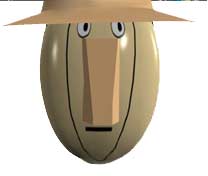Is Bourdieu's Habitus Mightier than the Sword?
Act One
Pierre Bourdieu, a preeminent French sociologist,
enters with the advancement of science in the late 20th century; he
meets Immanuel Kant, the German Enlightenment/Post Enlightenment philosopher,
who has been preserved in computer simulation for two hundred years.
They engage in a duel, an allegory for the dialogues surrounding the
sociology of taste--artistic and consumptive/productive. Bourdieu questions
the exclusion of the vulgar subject of sociology from middle class taste,
a taste which celebrates an attention to stylization and form. As the
classical music of Purcell begins, Kant is ready to stand up to Bourdieu
and posit his (Kant’s) theory of universal subjectivity and the
agent-action of disinterested observation used in viewing artworks,
and used in thinking about how to contemplate the object.
Act Two: The Space of Positions
Samuel Johnson, John Locke, and David Hume,
Enlightenment philosophers who have written about judgement, speak about
the subject in question. They too, have been preserved in computer simulation
and give a cross section of the thought of the Enlightenment, of which
Kant’s thought was a product. Hume tends to think that Locke emphasizes facts, textures, and perception, the empirical things. Aristotle concurs and leaves the conversation with reference to his work, the Poetics; while Augustine of Hippo in “living” memory of his dialogues with Evodius, steps out of static preservation to put temptation between free will and judgment. Finally Max Nordau, late Nineteenth century author of Degeneration and a life long Darwinist, positions Augustine’s
unchangeable good after Darwin, according to Science.
Johnson: As I told Boswell, man advances in life and is enlivened by Judgment, which he uses to estimate the true value of things.
Locke: Johnson, conceive of that thought in empirical terms! Primary bodies, though divisible affect the formation of our ideas through their innate power, while remaining the same in bulk, figure, number, motion, and most importantly texture.
Hume: Locke, I give approbation to your empirical method. However, I am skeptical of your still highly theoretical apparatus and wager common sense and practice in the arts of judgement.
Aristotle: I agree about Locke, Hume, but our best understanding of judgement or recognition comes from literature, as I say in my Poetics.
Augustine: Let us not forget about free will surrounding judgment and the temptation to yield to private good as opposed to the unchangeable good.
Nordau: And what would the unchangeable good be after Darwin? Immediately we see that the law of causality must fashion the will of the organism to bring science to morality and emotion to literature.
Act Three: The Habitus
Ludwig Wittgenstein, the 20th century
linguist and philosopher joins Bourdieu and they walk to the group
of Enlightenment, Ancient , and Nineteenth Century Philosopher(s).
They begin to discuss Bourdieu’s backup head which is based upon
the Igbo primitive culture theatrical headdress that primitive cultures
know as a representation of an ethnographer. Bourdieu has internalized
the vulgar object of sociology with the primitive culture version of
the sociologist, as his new head, the other lost in the duel with Kant.
As a tribute to the notion raised by Wittgenstein, that linguistic
acts are performed practically and form the fabric of society, Bourdieu
demonstrates his concepts for the group of philosophers. Primarily,
he demonstrates the habitus, the agent affected, affecting, structured
and structuring set of human social dispositions within cultural fields
that are neither tied exclusively into objective structures of the
Structuralists, a group of cultural theoreticians/practitioners in
the early to mid 20th century, or rooted exclusively in the agency
of actors which are the subject of study for Ethnomethodologists, and
Rational Choice Theorists (later 20th century and nineteenth century
respectively).
Wittgenstein and Bourdieu Walking, Bourdieu with ethnographer head from Igbo Masquerades
Wittgenstein: Bourdieu, indeed the logical is a symbol of the physiological (inversion of 210 Investigations)
Bourdieu: Yes my former countenance was more attractive but in the operandus physiologicus of the ethnographer I am much more functional:
Wittgenstein: And Social?
Bourdieu: let us let the domination of the ethnographer by the Igbo masquerade usage of cargo culture in turn ease the classical domination of subjects/objects by the ethnographer, and focus on the practice of the ethnographer despite his looks.
Wittgenstein: Domination of the ethnographer! Will you urge the group to show greater self reflexivity in philosophical/sociological practice?
Bourdieu: Exactly. I will engage them in reflections about their work
They reach the others.
Bourdieu to Hume: I designed the habitus to unmask the spontenaity in linguistic and social dispositions, I appreciate your call for common sense in the practice of taste.
Hume: Yes.
Bourdieu to Nordau: With your play, A Question of Honor, you do much to break down strains of positivism in the practice of physicians and scientists who are interested in Darwin.
Nordau: Yes although I feel strongly opposed to mysticism and the metaphysical, I am not a positivist.
Bourdieu to Locke: I am impressed by the quality of erudition in your work. It provides the allure of 18th century empiricism.
Locke: Thankyou.
Bourdieu to Augustine: For his sociological study of religion, Durkheim (I think) would be interested in your dialogues with Evodius on unchangeable Good.
Augustine: I’ll send a copy to him.
Bourdieu to Aristotle: The Moderns can contend with the Ancients but can still learn from the ancients, how to treat objectivity critically in science and art.
Aristotle: Yes, we must not oppose poetry and philosophy.
Bourdieu to Johnson: Ah , the compiler and early proponent of the cut and paste method in organizing thought and language, and thus a groundlayer of 20th century word processing.
Johnson: Like the pen, the scissors is as mighty as the sword!
suddenly Kant appears with sword: Et tu Hume, Nordau, Locke,Augustine, Aristotle, Johnson and Wittgenstein?
Hume, Nordau, Locke,Augustine, Aristotle and Johnson and Wittgenstein: Et nos! the Habitus...
Bourdieu: ...it turns out...
Hume, Nordau, Locke,Augustine, Aristotle and Johnson and Wittgenstein: is mightier than the sword!
